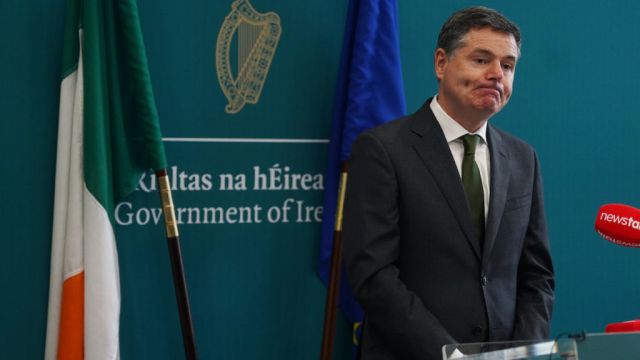The Government has officially approved plans to ease restrictions on pay and bonuses for staff at three banks bailed out by the Irish State.
Rules on bonuses of up to €20,000 and around other workers’ benefits at three banks – Bank of Ireland, AIB and Permanent TSB – are to be relaxed after ministers approved the measure brought to Cabinet by Paschal Donohoe.
Salary pay caps of €500,000 at Bank of Ireland are also to be removed based on the findings of a report into banking in Ireland.
This is one of the final measures to be brought by Mr Donohoe in his role as Minister for Finance, before a mid-December reshuffle.
Speaking to reporters on Tuesday, Mr Donohoe acknowledged the optics of the move, and said that it was being taken based on recruitment and retention issues at the three banks.
The Retail Banking Review had recommended the rules be loosened as competition for workers in the Irish banking sector has increased.
“Since the crash, Allied Irish Bank, Bank of Ireland and PTSB have quite rightly been subject to pay restrictions,” he said.
“However, the reality that I have to acknowledge, it starts with the passage of time and with developments in the banking sector, things are really changing.
“There is now a really strong competition for workers for our banks, both here in Ireland in our domestic banking sector and also in the international financial services sector.
“Meanwhile, the restrictions that are currently in place are causing challenges with staff recruitment and retention,” he said.
He said that this was particularly acute in risk, IT, cybersecurity and key legal areas.
Acknowledging that this was “a very difficult issue”, Mr Donohoe said the review “considered that the restriction should be amended”.
“A ban on variable pay up to €20,000 should be removed, and standard non-pay benefits should be allowed in all three banks.
“With regard to the pay cap of €500,000 and solely in relation to Bank of Ireland, the maximum pay cap should be removed.”
The move is to take effect within a number of weeks, Mr Donohoe added.
“It is critical to acknowledge that the state is no longer a shareholder in Bank of Ireland, having now recovered more in cash terms than the state bought into it.
“With regard to AIB and PTSB, the pay cap could then be considered in the future at a time when the state shareholding in them is at an appropriate level.”
He said that assessing this appropriate level was a matter for future governments.
Mr Donohoe added: “It is no longer appropriate that we determine the salary of anybody working in a bank that the State no longer holds a share in.
“I absolutely understand the sensitivity of the decision that I’ve asked government to make today.
“And I understand that for many that have been affected in such a negative way by developments that have taken place in our banks over many years, this recommendation, the decision to allow for variable pay up to 20,000 euro will be a cause of concern. I understand that.”
He said that the three banks employ around 20,000 people in the Irish economy and are responsible for over 220 billion euro worth of deposits.
“I want good people working in those banks that can look after our money, that can grow those banks in the year ahead and ensure they make a more powerful contribution to the Irish economy.”
He said analysis shows that employees are leaving banks in order to earn bonuses elsewhere, and that the decision was being taken to keep Irish banks competitive.
Mr Donohoe said a third of people who leave the three banks cite pay as an issue, and between 40 and 45 per cent go to other employers who can pay bonuses.
On Ulster Bank and KBC’s exit from the Irish market, Mr Donohoe said the review also found that it was unlikely that there would be new entrants into the sector, but said credit unions and digital banks do offer some similar services.
“The review believes that credit unions should be given the opportunity to provide increased competition at scale and on a universal basis,” Mr Donohoe said.
“With regard to competition overall, the review concludes that there is currently a reasonable level of competition in most areas, although there are only a limited numbers of entities offering overdraft and saving products.
“The critical point is that the level of competition must be monitored and action must be taken if warranted in the future,” he said.







